Reform in Qld ALP Still Needed: MORE THAN EVER
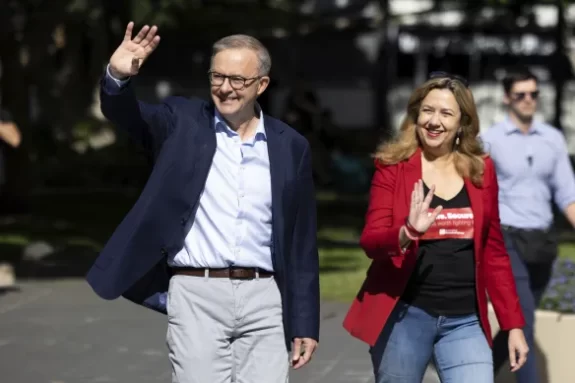
By Callen Sorensen Karklis
A strong history of Social Democracy
The Australian Labor Party was founded by striking shearers during the Australian Shearers strike in 1891 under the Tree of Knowledge in Barcaldine. Unlike the Eureka stockade in 1854 where rebelling unionists striking on unfair mining licenses against the Victorian Colonial Government were acquitted after the battle. One of the leaders Peter Lalor became the Speaker of Victoria’s Parliament. The striking leaders of Barcaldine were not acquitted and forced to serve time on St Helena in Brisbane’s Bay side.
Like the leaders of Eureka these leaders ended up becoming engaged in parliamentary politics as social democrats. William Hamilton, William Fothergill, Julian Stuart, and George Taylor all served sentences on St Helena for a time. Upon their release after several years in prison. Hamilton later became the MP for Gregory, and later the Qld Legislative Council and its President. Fothergill became a Barcaldine Alderman, Deputy Mayor, and later Mayor. While Stuart and Taylor returned to Western Australia.
In 1899 the world’s first Labor Government was elected in Queensland under Anderson Dawson (which only lasted 7 days) followed by Chris Watson who would become Australia and the world’s first Labor Prime Minister (in 1904 in a government that last 3 and half months). In 1904–1907 Qld Labor governed in a coalition government with Liberals. Labor in the 1890s–1900s became a successful political force. It also held the balance of power in the Australian parliament in coalition with the early protectionist government of Barton and Deakin in 1901–1904, and 1905–1908, before gaining enough support on its own to gain its first majority federally in 1910 under Andrew Fisher, while TJ Ryan won a majority as Premier in 1915 in the state parliament (Dyrenfurth, N. Bongiorno, F. 2011).
Ever since, the Australian Labor Party has been a political force to reckon with on the centre–left, with social democrats achieving significant reforms as a nation building party of the Australian political system. We all have welfare benefits, workers’ rights, the weekend, 40 hour week, penalty rates, universal healthcare in Medicare, superannuation, the NDIS, post war migration, Snowy River Hydro scheme, infrastructure like the Sydney Harbour bridge (Sydney), Story Bridge (Brisbane) Anti-Discrimination Act, no-fault divorce laws, Sex Discrimination Act, Native Title, Environmental protection of Antarctica, the CSIRO, ASIO, easier accessibility into high school and tertiary education, an Apology to the Stolen Generations – all thanks to Labor Governments. Labor has had a successful track record as social democratic movement compared to political movements globally.
With strong track records on both the state and local level as well: 70 years in Qld, 69 years in Tasmania, 63 years in NSW, 57 years in Western Australia, 54 years in South Australia, and 51 years in Brisbane City Council across all the voting electoral history of Australia since the 20th century.
A long history of internal party reforms
Despite Labor’s successes, there are moments where reform internally was needed. The first being the conscription issue. Where members of the ALP led by Labor figures like Frank Anstey (mentor to John Curtin) and TJ Ryan successfully pushed Billy Hughes out of the ALP as Prime Minister in late 1916 during the height of World War One. There were also figures like Ted Theodore who as Treasurer in the Scullin Government unsuccessfully advocated for Keynesian economic stimulus which Labor Premier William Forgan Smith advocated in his economic policies funding many of his programs which included benefiting the unemployment on construction projects at the University of Qld, and Story Bridge. Whilst Theodore was unsuccessful his policies were later adopted by both major political parties in Labor and the Coalition during times of economic hardship over the next century, particularly during the 1960s recessions, GFC, and COVID–19 pandemic.
At the time Keynesian methods were seen as controversial and split the ALP with Joseph Lyons and his supporters joining the Coalition to lead Australia as Prime Minister on the right and Jack Lang on the Left thinking the reforms didn’t go far enough forming their own Labor Party during the 1930s (Depression years). Former journalist John Curtin – who advocated against the conscription during the First World War – would become the new Labor leader and Opposition Leader during the Depression wildness years for the federal ALP. Ben Chifley and John Curtin were tasked with the necessary reforms needed to rebuild the ALP into a political body able to become electable particularly in NSW where the 2nd split did long-lasting damage to the party’s chances. The conciliatory leadership of Curtin and Chifley rebuilt Labor, uniting it in time for the Second World War (particularly in NSW) which Labor successfully led Australia through until its early post war years from 1941–1949, pushing for post-war reconstruction and benefits to assist everyday Australians.
As the post war years set in with Cold War hysteria and Labor once again faced a 3rd split, this time on Communism, and the hysteria of the Vietnam War which Labor opposed under Arthur Calwell (former Curtin/Chifley minister and Fabian). Fabian member and reformist Gough Whitlam rose through the ranks to lead the ALP in 1967 with a strong focus on Australia moving away from the White Australia Policy and advocated a strong reform agenda on national health cover, free education, land rights for Indigenous people, funding the arts, improving relations with Asia and China and withdrawing troops from Vietnam. To win government Whitlam had to focus heavily on the participants and Fabians like Race Matthews and Barry Jones, reforming the Victorian ALP away from oligarchic rule of old dominant Left faction at the time which continued with the help of the Independents in the 1970s–1980s in the Victorian ALP.
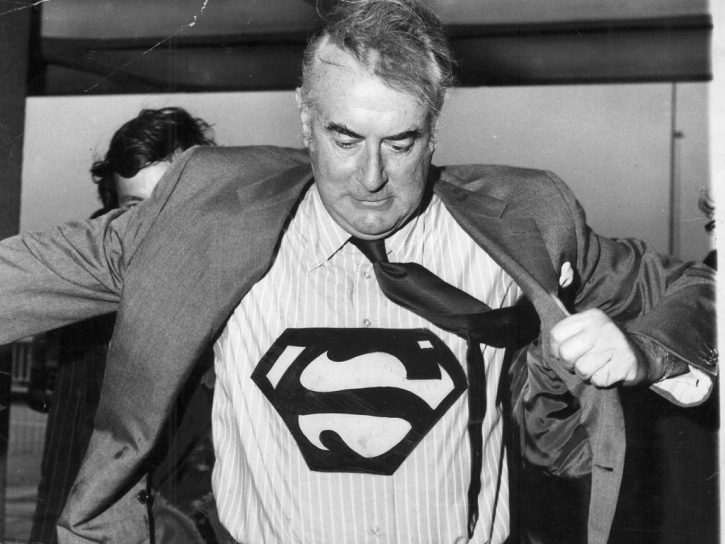
Whitlam was elected in 1972 as Prime Minister at a time that Labor had spent 23 years federally in the wilderness. Under Whitlam’s Treasurer and successor as Labor leader Bill Hayden from Qld advocated for strong reform in the party particularly in Qld which the Communist split cost Qld Labor government in 1957. The factions of the Old Guard left-wing Trades Hall controlled the ALP until the intervention of 1980–1989, where Labor did not win a state election for a record 32 years where the Country/National party reigned supreme under Frank Nicklin/Joh Bjelke–Petersen and successors.
The reform group were particularly focused on environmental, civil liberties for First Nations peoples and LGBTIQ people, and women’s issues. Led by Denis Murphy, Manfred Cross, George Georges, Wilf Ardil, Terry Hampson, and Mike Reynolds aligned with support from party organisers Peter Beattie and Wayne Goss. The intervention laid the groundwork where the branch rank-and-file could have more of a say whereas prior to 1980 it was a union-controlled party (Yarrow, S. 2015). The reforms made Labor electable over the next decade where Wayne Goss became Premier of Qld (1989-1996). Under Goss much of the issues Qld ALP reformers and Fabians advocated for, became government policy; such as the decriminalization of LGBTIQ status, the Fitzgerald Inquiry recommendations into corruption, and ending sand mining on Fraser Island. Labor also benefited from Hayden’s party reforms for 13 years federally under the leadership of PMs Bob Hawke/Paul Keating who reshaped the health system, environment, welfare, and both Indigenous and women’s rights.
Political Wilderness under Howard era (1996 – 2007) to the Rudd/Gillard (2007 – 2013) era
During the Hawke/Keating era, factions of the ALP became more institutionalized, thanks to the reforms of Hayden. Factions have always existed in political parties since time immemorial, but they became more accepted during the 1970s-early 1980s of the ALP as society changed and to avoid party infighting having learned from the lessons for 3 party splits federally, and 4 on a state level. William Kidston objected to the socialist objective in 1907 and resigned from the ALP as Premier. Hawke also organised the Labor Accords with the business and trade union communities to ensure stability. Factions exist but perhaps more in Labor where it was used by the Coalition during the Menzies era to the Coalitions advantage when highlighting the “Faceless Men of the ALP”. Because they are so entrenched in Labor they can be a tricky area to manoeuvre. I was in 2 during my Young Labor days having been a whip in the Young Left state conferences, socializing with the Soft Left subgroup and recruiter while also assisting the moderates in the Old Guard Unity in my mid-20s after becoming disillusioned on certain social circles, preselections, and party policy areas relating to First Nations issues and the environment.
On the left is the ETU (electricians), UWU (miscellaneous; representing blue collar workers who are; cleaners, childcare workers, disability support, hospitality, health, aged care, logistics, supermarket supply, security, farming, manufacturing, and market research), the AMWU (Australian Manufacturing Union), the CFMMEU (Construction Forestry Maritime Mining and Energy Union) and on the Right is the AWU (Australian Workers Union), the TWU (Transport Workers Union), and the SDA (Shop Distribution Association) which had been controversially known for its part in the Industrial Groups in the 1950s-1980s and the DLP (Democratic Labor Party) during the communist split. The Left has usually been more in favour of economic interventionist policies while supportive of social justice issues, while the ALP right has been more politically liberal.
In most cases factions worked within the system of the party and through conferences, meetings, conciliations to cut deals on matters of both senate local preselections via the electoral college, which the union bosses to this day have some say over. Not all unions in the ACTU are part of the ALP despite some of their staff being active in the party. But a majority of the unions involved in the ACTU and Qld Council of Unions are affiliated members of the party. Most ALP staff and unionist organise around themselves being in a faction to climb the political ladder and have sway over their preferred candidates and policies. But most ALP branch members are not aligned with a faction, nor are all of Labor’s politicians. In 2003 former Labor and ACTU leader Simon Crean sacrificed his leadership by granting more say for branch members in preselections. The unions in turn turned from Beazley to Crean, to Latham to Beazley upon defeat after defeat.
During the Rudd/Gillard era Labor abolished the controversial and highly unpopular WorkChoices laws introduced by the Howard government, introduced the Fair Work Commission, increased LGBTIQ financial rights, apologised to the Stolen Generations, stimulated the economy during the GFC maintaining a triple-A credit rating, introducing a Commission into Child Sexual Abuse, the NDIS, the NBN, improved international relations with Asia particularly India and China, paid parental leave, reforming the Murray River water management, transforming federal/state health funding, reforming secondary education and expanding tertiary education, withdrawing troops from both Iraq and Afghanistan and instituting a carbon price. Despite these achievements the Rudd/Gillard era was eclipsed by the egos of constant leadership spills and revolving doors which was due to several contributing factors; personality politics, union bosses, reliance on 24/7 news cycle and polling. On the mornings of 24th June 2010 and 27th June 2013 Australian voters woke up to a new Prime Minister in both occasions where the Australian people didn’t have a say on the change of Prime Minister. True, this had occurred 4 times historically when Stanley Bruce and Earle Page rolled Billy Hughes in 1923 as Nationalist Prime Minister, Robert Menzies returning from an overseas trip to Britain to a divided Coalition unhappy with his first leadership term in 1941 resigning for Arthur Fadden, William McMahon rolling Liberal Prime Minister John Gorton in 1971, and the Hawke/Keating spills of 1991.
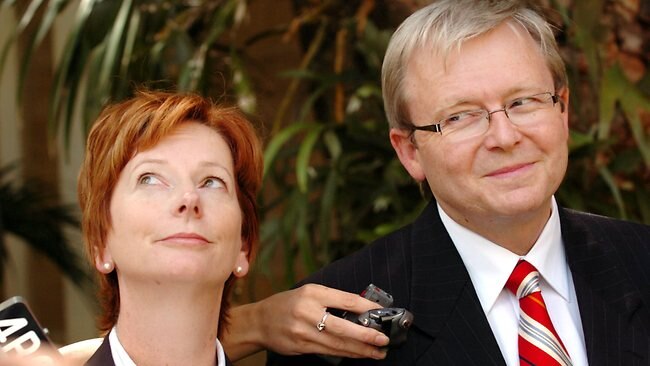
But due to a 24/7 news cycle and digital space the attention became more focused and refined from a time where print media was moderate in the public space and attention span. In response to the infighting a lacklustre federal election result in 2010 John Faulkner and former NSW Premier Bob Carr and former Victorian Premier Steve Bracks recommended more branch rank and file say in the rules and preselection process of the wider ALP in the form of a review. Rudd – during his brief second term as Labor leader – introduced the 50:50 leadership rules where the branch members and party members would have half of the proportional say in future Labor leadership elections or spills. Where the over half would be decided by the federal parliamentary wing of the ALP. On a state level in the aftermath election loss of Anna Bligh to Campbell Newman’s LNP where Labor had only secured 7 seats to the LNP’s 78 seats.
The party’s greatest success in structure also became its undoing in the 21st century, especially as unionists accused some reformers of being “anti-unionist” while reformers said of some union bosses of being “antidemocratic”. In some ways it was difficult to many internally who were pro-reform yet also proudly union. Unfortunately, like most institutions in a modern context union membership today sits at 1.5 million (estimate) according to 2016 figures while it was 2.5 million in 1976 (Bramble, T. 2008). As of 2020 at the start of the pandemic the ALP federally has 60,085 members with the Coalition on a similar number nationally. A big change when compared to the days when a major political party of Australia held a membership of almost 200,000 members in the 1950s and a declining primary vote since 1949-1972, exacerbated in the 1990s-early 2000s. [Figure 1.0].
Recent Reforms during Recent Wilderness and Rise of ALBO! (2013 – Present)
In 2013 after the federal election loss of Labor to the Coalition, local Labor was founded along with Open Labor in Victoria to support ALP party reform again in a more modern context. The QLD Labor branch introduced 30:30:30 as a compromise with the unions having a contributing say for branch members, and the parliamentary members in the State Parliamentary wing of the party. Most of the recommendations of Faulkner, Carr, and Bracks were largely ignored in NSW until after the 2015 election loss with the ALP out of state power since 2011. The captain’s pick of then Indigenous sports star Nova Perris as Senate candidate over long-term Labor Senator Trish Crossin (1998-2013), and Qld Senator Jan McLucas who won 57% of the branch vote but lost the union vote and support in 2016’s preselection in the lead up to the 2016 Federal election.
Local Labor was led by Stuart J Whitman; a Townsville Labor acolyte of party reformer and former Qld Speaker Mike Reynolds, Rudd staffer and supporter. He was assisted by Rudd staffers Brad Newman, Rod Biesel (Annerley Labor Branch and Leftie), Kevin Conway (former public servant, Labor Leftie, later state and federal Fabians Secretary), Mike Smith (Labor Leftie, public servant who also grass roots campaigned with the US Democrats in 2012’s US Presidential elections), Kerrie Kahlon (former Australian Young Labor President), Chaiy Donati (whom I originally had disagreements within Young Labor, who was originally from the AWU right and later moderate reformer who was the former President of Qld Young Labor). I also endorsed the reforms as Labor Branch Secretary, Vice-President and President (2012-2015, 2017) in the Cleveland area as well as being the Vice-President of both the Bowman FEC and Cleveland SEC and was the SEC Secretary for a time also assisting in a Labor Party conference vote as the Returning Officer for Bowman.
Before becoming disillusioned with the party processes in 2017 over First Nations and environmental issues surrounding the Adani and Toondah Harbour PDA issues, the ALP lost the 2019 federal election on negative gearing, tax policies and the Adani issue namely in Qld. I remained active in Labor LEAN only from 2017–2020 on the Toondah campaign, Assistant Secretary and Interim Secretary of the Qld Fabians (2016–2018) and advocating for the unemployed in the AUWU in 2020 during the pandemic before working in Cr Peter Cummings Wynnum Manly ward BCC office (former Labor leader of BCC 2016-2020). I was briefly the Local Labor Secretary in 2017 where Local Labor were successful in advocating for a code of conduct policy with the Qld branch of the ALP when former state MP Evan Moorhead was State Secretary. Considering former candidates being improperly managed or bullying in the party particularly in areas of Young Labor or across Branches. Such as the case of Peter Watson in 2012 who made neo-Nazi and gay slur comments or in some cases discrimination and sexual harassment.
As a proud union member and supporter more branch rank-and-file say could be seen as controversial but considering how less Australians view unions less relevant to them. Having union members encouraged to join the ALP to be part of the process as branch members could be a good thing. I’ll never forget an AWU organizer shouting at the 2013 Qld State Labor conference “If its broke don’t fix it!”. Not helpful comments considering how Labor at the time had lost elections across the board on every levels of government.
As Whitlam once professed in his speech in the 1967 annual conference of the Victorian ALP, “Only the Impotent are Pure” when describing the self-defeatism culture of the ALP then prominent in Victorian Labor. Members and former MPs also called for an independent dispute’s tribunal in the party. Former Labor leader Bill Shorten even called for increased membership involvement in preselection’s for the Lower House (70:30 split between local members and a central panel) and for the Senate (50:50 split), increased AA (affirmative action for women), and direct elections of delegates to the national conference(s) of the ALP. As of 2014-2017, there was shift to the ALP in Victoria (2014), Queensland (2015), and Western Australia (2017). Unfortunately, despite the good these governments did it was clear there was still room for improvement as was the case of Adem Somyurek (former Andrews Minister) who according to 60 Minutes was behind a massive branch staking operation in the 48th Victorian Parliament.
These issues mirrored the Shepherdson Inquiry in Queensland Labor in 2000 during the Beattie era, when 3 MPs and several party officials with links to the AWU right of the QLD ALP had links to falsified documentation of branch recruitment. One of which scenario included recruiting dead people into a Labor Branch from a cemetery. This saga saw the downfall of 3 state MPs including Deputy Premier Jim Elder, who was a long-term Goss/Beattie minister as well, and former State Secretary of the QLD ALP in 1993–2000, Mike Kaiser. all in the lead up to a state election. Like Peter Beattie in 2001, Daniel Andrews in 2022 used accountability front and centre to their election campaigns and Labor increased its vote. As the MPs in question relating to the branch stacking controversies resigned, a notable temporary reform pursued by Local Labor and Open Labor groups was the Labor Academy in South Australia to ethically train new ALP activist and staff on skills-based focused rather than the revolving door of using Young Labor factionalism as a means of recruitment.
Today in the current parliament there are several new independent MPs, namely the TEALs (environmentally savvy MPs funded by the group Climate200). The surge of Greens MPs in South-East Qld Brisbane seats and Melbourne which has steadily been rising since 2010 along with increasing TEAL aligned MPs. Although the ALP won a majority on 77 seats, and the majority of TEALs has mostly affected the Coalition moderate MPs base attracting middle–class progressive voters on issues like climate change action, feminism, and implementing a national ICAC. The Teals won 6 seats nationwide in 2022, including Zali Steggall, and Helen Haines who held office since 2019. In Brisbane Labor failed to win the seat as the Greens won the seat with Stephen Bates as Labor lost former Labor safe seat Griffith to Max Chandler Mather (a former colleague in the Young Labor Left before switching to the Greens). The LNP also lost its safe seat of Ryan to Elizabeth Watson Brown and the Greens. Labor only won all of its incumbent seats bar 1 loss in Griffith, with most of its gains in NSW, SA, Victoria, and particularly WA. The ALP to date only holds 5 seats in the federal lower house and 3 Senators when compared to the 2007 federal election when Labor last won from opposition when it won 15 seats including 4 seats in the Qld regions (Leichardt, Dawson, Capricornia, and Flynn). These seats failed to come close to Labor in 2022, which could be trouble for Labor at the upcoming 2024 Qld State election if it’s not careful.
Compared to Labor’s first elections in Qld federally it used to be the heartland of federal Labor with both Andrew Fisher and Frank Forde holding seats for a time; Fisher in Wide Bay (1901-1915) and Frank Forde in Capricornia (1922-1946). The Father of Medicare former Whitlam health minister (1972-1975) Dr Doug Everingham also held the Capricornia seat in the 60s, 70s, and early 80s. It had a strong Labor history of 87 years being held by Labor despite being regional in all of federation, with an increased margin of 14.60% towards PHON in the seat [Figure 3 & 4] and regional Queensland voters shying away from Labor to both the LNP, PHON and the KAP on preferences, particularly as Queensland transitions into renewables away from fossil fuels mining and transitions into mining lithium, cobalt, and nickel mining.
The 2022 Federal Election and 2017 and 2020 Qld State Elections which saw the election of Amy MacMahon of South Brisbane against former ALP Deputy Premier Jackie Trad in 2020, along with Michael Berkman in Maiwar in 2017. With the votes towards the Greens increasing particularly in Brisbane City Council wards in 2020 in 6 ward areas such as Walter Taylor, Paddington, Brisbane Central, Coorparoo, Pullenvale, and the Gabba, while the ALP is increasing its margins in 5 wards with its already held 5 Labor wards; namely Calamvale, Bracken Ridge, Enoggera, Jamboree, and Merchant. Hypothetically, if Labor and Greens were to do well in the 2024 City Council elections in Brisbane or beyond it would put the Greens possibly on 6 seats compared to Labor on 9-10 giving both parties a 15-16 majority the first time the progressive side of politics has done so since 2008 since Campbell Newman and the LNP sustained a landslide for well 16 years.
The LNP have adapted to greening Brisbane to hold off the rising surge in progressive voters. But this might not be enough as voters from further south have called SEQ home during the pandemic interstate migrations as well as an increasing younger voting population, and voter disillusionment with the major parties [Figure 2.0]. It may be a hard pill to swallow for Qld Labor, but it may have to negotiate both a preference deal and or coalition administration with the Greens in Brisbane City Council, considering that Brisbane is the largest City Council in Australia and home to 2.6 million people. It outranks the NT, ACT, and Tasmania put together in sheer size of population and administration, with a public service larger than some states and territories. It would follow the same steps Labor had to with the Greens in Tasmania (2010-2014), ACT (2012-present), and New Zealand (2017-present) under both Ardern and Hipkins. To do not do so could be political suicide.
The Greens have become cleverer, grassroots, particularly engaging in unionism among groups like the AUWU and RAFFWU where the SDA has failed members on industrial matters with Fair Work. It also doesn’t help when Qld has been the highest ratio of state Labor branches to refuse membership to new members without disputes tribunal process say and or on grounds of environmentalist pushing more people towards the Greens and Teal campaigns by being more inclusive. Labor too must adapt and change this.
The ALP and the labour movement are far from perfect; they are always evolving and changing. Remember that Labor while envisioning a working men’s paradise at the turn of the 20th century also strongly supported the White Australia policy well into the early 1970s. Although it created public assets for much of the 1910s-1970s, and privatised assets during the Hawke/Keating era like the Commonwealth Bank, Qantas, and QR Rail under Bligh in 2009 during the 2007-2008 GFC. Good and bad decisions are made, and good and bad people can exist in any Labor faction but for Labor to survive into the next century, in this century it must adapt to continue its democratic trend. The nature of the beast in politics is sometimes leaders are both faced with difficult circumstances and need to make difficult decisions as well. Perhaps Labor could also learn from the issues that have made both the Teals and Greens electable in seats in 2019–2022, such as the housing and rental crisis, including dental in Medicare bulk billing, limit overdevelopment in environmentally sensitive areas, limit gas and coal projects in favour of new industries, fight homelessness by initiating similar programs that William Forgan Smith did, support compulsory preferential voting. Considering that Labor only holds several regional councils in Townsville, Rockhampton, and Mt Isa. With most QLD regional City Councils being held by LNP Crs would it be so bad to implement compulsory preferential? It would mean increased Greens Crs, sure! But it would increase Labor candidates’ chances in local races as well as Independents regardless their politics which would be better for democracy.
As democracy is being challenged by extremist and “strong men” taking over the American Republican party under Trump, Putin in Russia, and Xi in China, now is the time for Qld Labor to showcase its democratic credentials and adapt to the times and it might even win more seats on any of the 3 tiers of government.
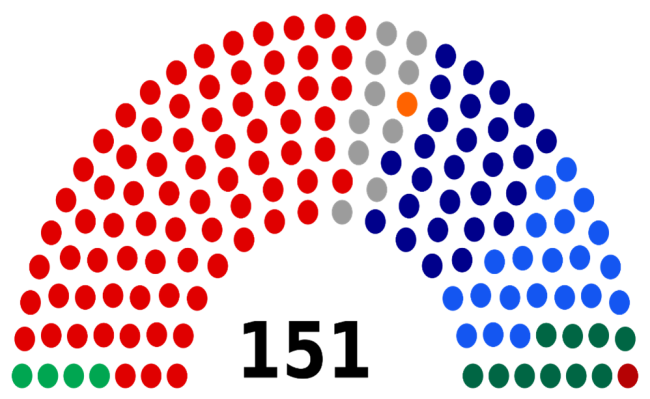
The 2022 Federal Election Results; House of Representatives ALP = 77 seats Coalition = 58 seats Independents = 10 seats o Teals = 9 seats o CA = 1 seat Greens = 4 seats KAP = 1 seat
Local Labor’s Patrons
Chris Haviland (Admin Committee NSW Labor, public servant, teacher, cricket umpire)
- Campbelltown City Council Alderman (1987 – 1993)
- Macarthur Federal MP (1993 – 1996)
- President of the Bradfield FEC (LEFT faction)
John Faulkner (teacher, research officer, Assistant Secretary NSW ALP: 80 – 89)
- Senator for NSW
- Minister for Veteran Affairs (1993 – 1994)
- Minister for Defence Science and Personnel (1993 – 1994)
- Minister for the Environment (1994 – 1996)
- Special Minister of State (2007 – 2009)
- National President ALP (2007 – 2008)
- Vice – President of the Executive Council (2007 – 2010)
- Minister for Defence (2009 – 2010)
- Father of the Australian Senate (2014 – 2015) (LEFT faction)
Janelle Anne Saffin (teacher, lawyer)
- NSW Legislative Council (1995 – 2003)
- Page Federal MP (2007 – 2013)
- NSW Lismore State MP (2019 – Present)
Andrew Leigh (lawyer, academic author, professor at ANU)
- Fraser Federal MP (2010 – 2016)
- Fenner Federal MP (2016 – Present)
- Parliamentary Secretary to Julia Gillard PM (2013)
- Assistant Minister for Competition, Charities, and Treasury (2022 – Present) (RIGHT faction)
Fiona Richardson (political advisor) (passed away in 2017) (RIGHT faction)
- Victoria Legislative Assembly (2006 – 2017)
- Parliamentary Secretary for Education (2007)
- Parliamentary Secretary for Treasury and Finance (2007)
- Minister for Women and Prevention of Family Violence (2014
- Oversaw the Victorian Royal Commission into Family Violence in 2015
Curtis Pitt (public servant) (MODERATE RIGHT faction aligned with LEFT in QLD)
- QLD State MP Mulgrave (2009 – Present)
- Minister for Disabilities, Mental Health, ATIS Partnership(s) (2011 – 2012)
- Treasurer of QLD (2015 – 2017)
- Minister for Sport, Employment, Industrial Relations, ATSI Partnership(s) (2015 – 2017)
- Speaker of QLD Parliament (2018 – Present)
Denise Allen (beauty therapist, modelling agency, retail business owner) (passed away in 2022)
- State MP for Benalla (Victoria) (2000 – 2002)
Join us in Local Labor Qld if you would like to campaign in Local Labor Qld to advocate for compulsory preferential voting reform in QLD, social justice issues, and more democratic say in Labor for members! Contact me via M: 0450 359 863.
Contact Chris Haviland, or Nicole Campbell for INFO about NSW Local Labor (or) Janet McCalman or Eric Dearricott via the Open Labor Victoria website. Openlabor.net.au.
Extra Resources
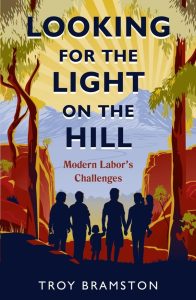
1 Troy Bramston is senior writer and columnist with The Australian since 2011. He is also a contributor to Sky News and a former speech writer in the Rudd Government. This book analyses the need for reform in the ALP after the 2010 federal election hung parliament.

Figure 1.0 [Primary Vote(s) since 1949]
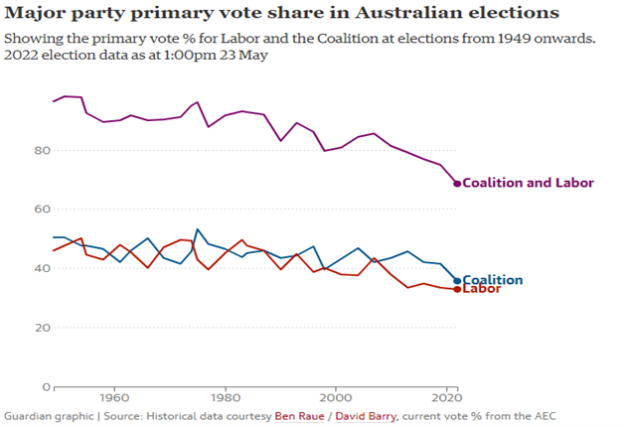
Figure 2.0 [Comparison of Generational Voting]

Figure 3.0 [Capricornia Primary Votes]
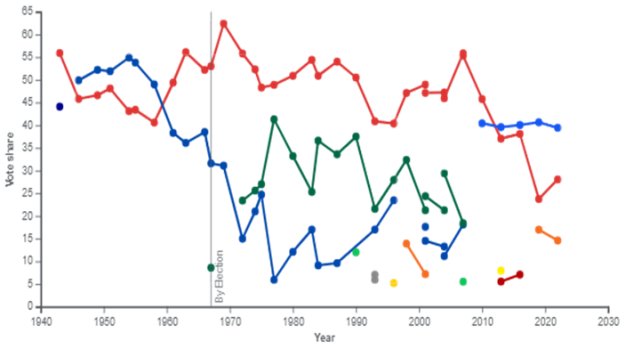
Figure 4.0 [Capricornia TPP = Two Party Preferred Votes]
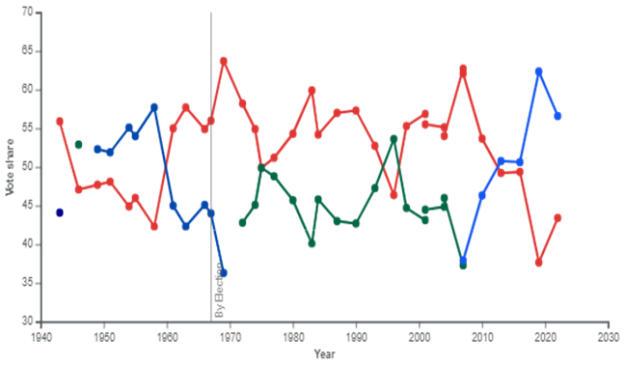
Figure 5.0 [Australian Federal Election 2007]
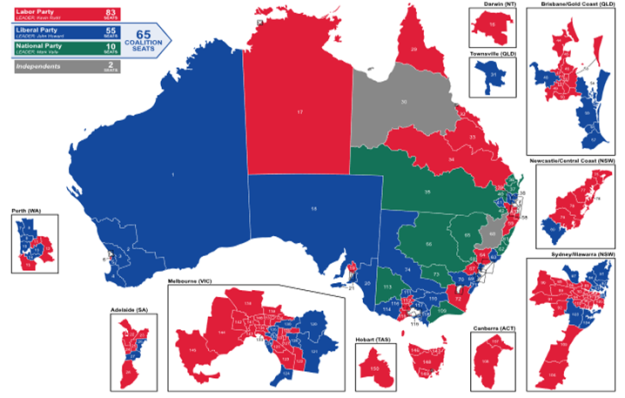
Figure 6.0 [Australian Federal Election 2022]
Note: 1 regional seat is ALP in QLD (Blair) while the rest are LNP or KAP. QLD Labor only has 5 seats in the lower house.
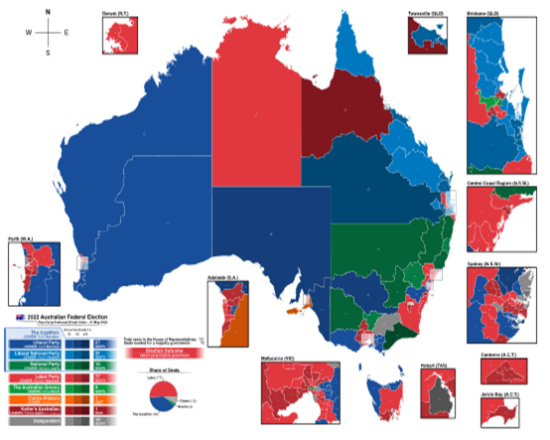
References
Alexander, J. (2022). The rise of Australia’s teal climate warriors. <https://www.spectator.co.uk/article/the-rise-of-australia-s-teal-climate-warriors/> accessed 05/03/2023.
Barry, N. (2015). Longing for Labor to reform itself? National Conference may not provide it. The Conversation. <https://theconversation.com/longing-for-labor-to-reform-itself-national-conference-may-not-provide-it-44698> accessed 05/03/2023.
Bracks, S. Faulkner, J. Carr, B. (2010). Review 2010| 2010 National Review| Report to the ALP National Executive| Australian Labor Party (ALP) <https://ouralp.files.wordpress.com/2019/09/2010_faulkner_carr_bracks_review.pdf> accessed 05/03/2023.
Bramble, T. (2008). Trade Unionism in Australia. A History from Flood to Ebb Tide. Cambridge University.
Bowden, B. (2013). Modern Labor in Queensland: It’s Rise and Failings, 1978–98. Labour History. Griffith University.<https://research-repository.griffith.edu.au/bitstream/handle/10072/56318/90393_1.pdf?sequence=1> accessed 05/03/2023.
Clarke, P. (2013). Whitlam The Power and the Passion. [DVD] ABC (Australian Broadcasting Corporation).
Davies, A. (2020). Party hardly: why Australia’s big political parties are struggling to compete with grassroots campaigns. <https://www.theguardian.com/australia-news/2020/dec/13/party-hardly-why-australias-big-political-parties-are-struggling-to-compete-with-grassroots-campaigns> accessed 05/03/2023.
Dyrenfurth, N. Bongiorno, F. (2011). A Little History of the Australian Labor Party. University of New South Wales Press.
Giuliano, C. (2022). Voting Patterns to major parties by generation. Australian Parliament. <https://www.aph.gov.au/About_Parliament/Parliamentary_Departments/Parliamentary_Library/FlagPost/2022/April/Voting_patterns_by_generation> accessed 05/03/2023.
Grattan, M. (2022). Age and education key demographics in government’s election loss: ANU Study. The Conversation. <https://theconversation.com/age-and-education-key-demographics-in-governments-election-loss-anu-study-185374> accessed 05/03/2023.
Green, A. (2020). Brisbane City Council Election 2020 Results. <https://www.abc.net.au/news/elections/bcc/2020/results?filter=all&sort=az> accessed 05/03/2023.
Green, A. (2022). Australian Federal Election 2022 Live Results. <https://www.abc.net.au/news/elections/federal/2022/results?filter=all&sort=az&state=all> accessed 05/03/2023.
Jabour, B. Hurst, D. (2012). Labor teen regrets wording of gay slur, but stands by racism. <https://www.brisbanetimes.com.au/national/queensland/labor-teen-regrets-wording-of-gay-slur-but-stands-by-racism-20120221-1tk95.html> accessed 05/03/2023.
Manwaring, R. (2011) The paradox at the heart of Labor’s review. Inside Story. <https://insidestory.org.au/the-paradox-at-the-heart-of-labors-review/> accessed 05/03/2023.
Massola, J. (2012). ALP must change or be changed: Crean. Financial Review <https://www.afr.com/politics/federal/alp-must-change-or-be-changed-crean-20121206-jijl3> accessed 05/03/2023.
Mccalman, J. (2021). Open Labor. Non – aligned Victorian Labor politicians poster 1970 – 2018.
Parnell, S. (2020). Labor’s one – time rising star Mike Kaiser lands back in government ranks. IN QUEENSLAND. <https://inqld.com.au/news/2020/11/20/fallen-labor-star-mike-kaiser-back-in-government/> accessed 05/03/2023.
Sansom, M. (2015). Asset sales dominate NSW and Qld elections. Government News. <https://www.governmentnews.com.au/asset-sales-dominate-nsw-qld-elections/> accessed 05/03/2023.
Wahlquist, C. (2022). Teal independents: who are they and how did they upend Australia’s election? The Guardian. <https://www.theguardian.com/australia-news/2022/may/23/teal-independents-who-are-they-how-did-they-upend-australia-election> accessed 05/03/2023
Yarrow, Susan (2015). Split, intervention, renewal: the ALP in Queensland 1957 – 1989. MPhil Thesis, School of Historical and Philosophical Inquiry, The University of Queensland.
<https://espace.library.uq.edu.au/view/UQ:356593> accessed 05/03/2023.
 Callen Sorensen Karklis, Bachelor of Government and International Relations.
Callen Sorensen Karklis, Bachelor of Government and International Relations.
Callen is a Quandamooka Nunukul Aboriginal person from North Stradbroke Island. He has been the Secretary of the Qld Fabians in 2018, and the Assistant Secretary 2018 – 2019, 2016, and was more recently the Policy and Publications Officer 2020 – 2021. Callen previously was in Labor branch executives in the Oodgeroo (Cleveland areas), SEC and the Bowman FEC. He has also worked for Cr Peter Cumming, worked in market research, trade unions, media advertising, and worked in retail. He also ran for Redland City Council in 2020 on protecting the Toondah Ramsar wetlands. Callen is active in Redlands 2030, Labor LEAN, the Redlands Museum, and his local sports club at Victoria Pt Sharks Club. Callen also has a Diploma of Business and attained his tertiary education from Griffith University. He was a co-host from time to time on Workers Power 4ZZZ (FM 102.1) on Tuesday morning’s program Workers Power. He currently works as a public servant in Qld and the Secretary for Qld Local Labor.
Like what we do at The AIMN?
You’ll like it even more knowing that your donation will help us to keep up the good fight.
Chuck in a few bucks and see just how far it goes!
Your contribution to help with the running costs of this site will be gratefully accepted.
You can donate through PayPal or credit card via the button below, or donate via bank transfer: BSB: 062500; A/c no: 10495969










5 comments
Login here Register here-
Ken Robinson
-
New England Cocky
-
Steve Davis
-
Terence Mills
-
Phil Pryor
Return to home pageI feel that both major parties have lost their way and do not serve the people, by putting themselves and party first over the peoples needs and poor old AUSTRALIA misses out, there needs to be a serious overhaul of how candidates are selected, the Howard years reigned supreme not because he was good, but the opposition candidates were unelectable, hence the mess we are in now with poverty and homelessness rife, now we have a choice of voting for the least worse instead of the best.
@ Ken Robinson: Agreed.
The Albanese LABOR government has to stop being scared of the Merdick media-ocrity and make the necessary reforms in media (sack the Merdick plants in ABC), grandfather negative gearing to reduce residential prices, fund education with a voucher system providing the same amount of government funding to whatever school the parents chose to support (as occurs in NZ), terminate funding for petroleum exploration because Australia is going alternative energy and that funding is really a gift to foreign owned multinational corporations, renovate and re-open national railway lines between metropolitan cities the Great Northern railway between Newcastle NSW and Brisbane, obviously abandoning the Stage 3 tax cuts for the wealthy is essential for social justice, and revies the Universal Basic Income (UBI) model from Canada to reduce the demand for health service.
Ken R, well said.
The big problem is that representative democracy has been around so long that it’s passed its use-by date. One consequence of this is that it has developed institutions within the institution, so career paths can be forged within a major party, after which the party becomes the focus and the social good can be ignored. Even winning office becomes a secondary consideration to maintaining power within the party.
And yet, Labor is still the best option despite being caught up in all the institutional problems, as it is the only major party that is philosophically committed to the social good.
Labor now controls all governments on the mainland and federally and that is a moment to savour and should send a message to the right-wing commentators, particularly within the News Ltd organisation who have dropped al pretence at impartiality in their blind obsession with Liberal (read conservative) agendas.
It was quite revealing watching the SKY News coverage of the NSW election : Peta Credlin was snarling that the Left wing media had been the problem for the Liberals – she overlooked the wall to wall campaigning by her employer for the Right (including One Nation).
The Upper House in NSW will be interesting as Mark Latham is only focused on holding the balance of power in NSW as is the case with Hanson in the federal Senate.
Personally I think that the Liberal strategy in exhuming JW Howard in the final days of campaigning probably damaged them – this man has definitely passed his use by date !
The right wing conservatives here and everywhere are ugly, selfish careerists who do not intend to represent all people, merely paying and supporting interests. Only the ALP is basically a broad people’s party here. But what NSW’s new government will and can do is a challenge, a mystery. AUKUS concerns remain, that farce and disgrace. Articles in Pearls and Irritations display essential resources for discussion. Seek and ye shall find, something. (Jack Howard makes a cadaver look intelligently active.) But, as is the mood of most commentators, our local and international outlook is dangerously poor. What long term hope for the planet, climate, peace..? As for R Merde, the Dog, Sty non news and the Cretin, up their deranged and erroneous Khybers…